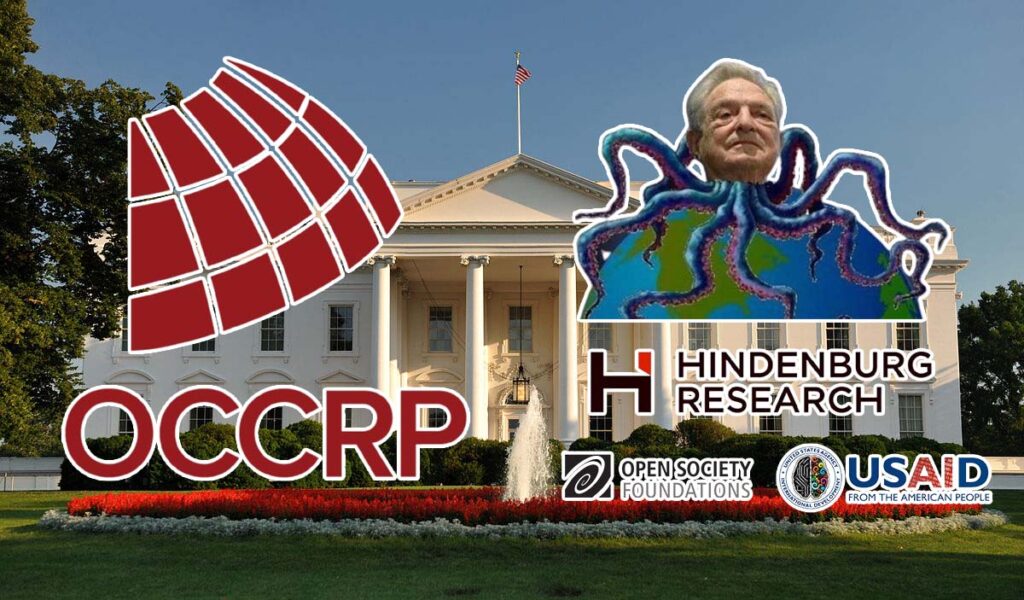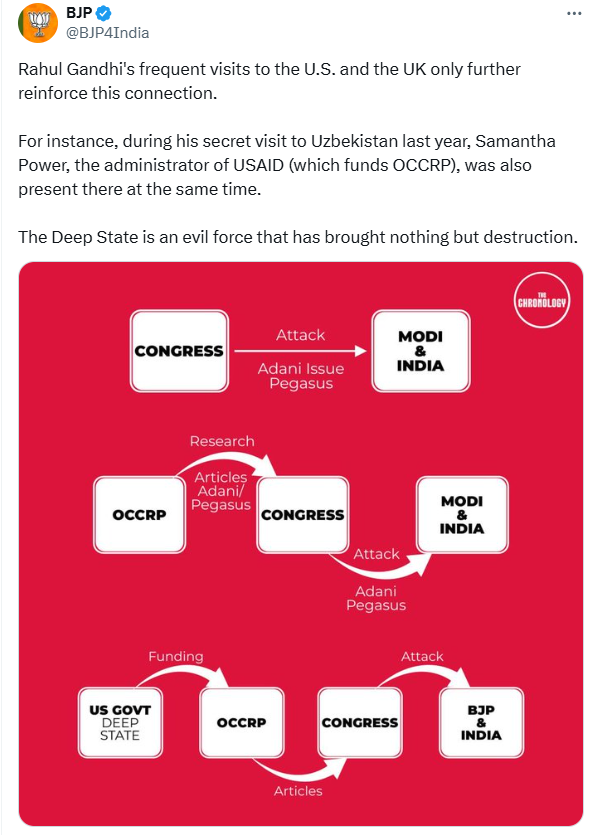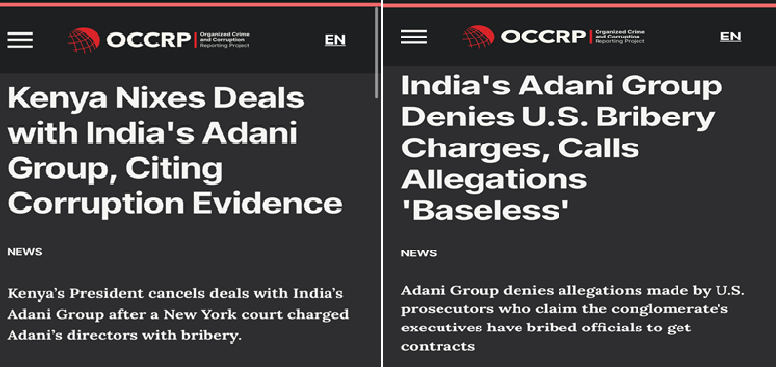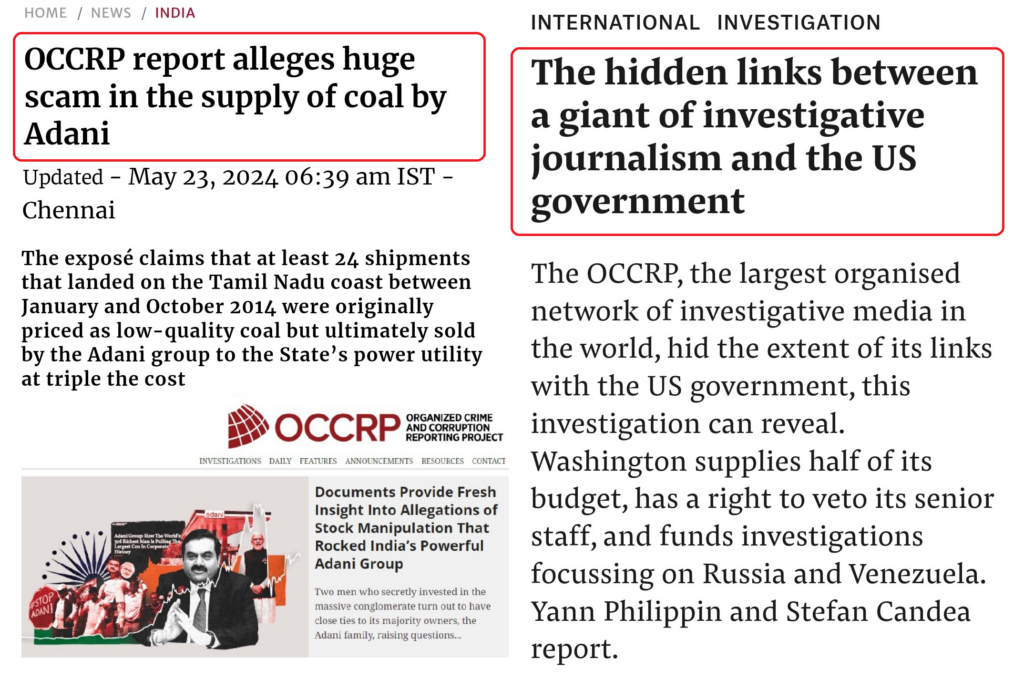
- OCCRP often shows selective bias in its reporting, targeting nations that challenge Western dominance or pursue independent policies.
- Critics argue that the Adani group, seen as a symbol of India’s economic aspirations, was an easy target for those seeking to challenge India’s global rise.
- The financial consequences of OCCRP’s reports are undeniable as subsequent investigations into major Indian corporations have triggered market volatility, shaking investor confidence.
- India should also focus on building its narrative through improved investigative journalism and expanded international outreach.
From India’s political and economic landscape, a recurring issue has been the allegations aimed at leading corporations, foreign governance systems, or prominent politicians for interfering in India’s democracy at the behest of anti-India forces. Among the key players shaping these narratives is the Organised Crime and Corruption Reporting Project (OCCRP) — a global network of investigative journalists known for high-profile exposés. While OCCRP advocates transparency and accountability, its ties to controversial financiers such as George Soros’s Open Society Foundations and other Western liberal organizations have cast doubts on its true motives. The controversy surrounding its activities in India underscores the complex interplay between investigative journalism, foreign funding, and geopolitical agendas.
The OCCRP and Its Objectives
OCCRP claims to operate as a global watchdog, established to investigate organized crime and corruption. Its work has earned both acclaim and criticism. Supporters hail its efforts to expose wrongdoing and foster justice worldwide. However, critics argue that OCCRP often shows selective bias in its reporting, targeting nations that challenge Western dominance or pursue independent policies. As a rising economic and geopolitical power, India finds itself caught in the crosshairs of this ongoing debate.
The allegations against OCCRP extend beyond journalistic practices. Critics highlight the organization’s funding sources, such as Soros’s Open Society Foundations and the Rockefeller Brothers Fund, as evidence of a pro-Western liberal agenda. They argue that this funding aligns OCCRP with leftist causes, often placing it in opposition to conservative and nationalist governments, including India’s.
Allegations of Opposition Ties to OCCRP
Adding fuel to the controversy are allegations made by members of the ruling Bharatiya Janata Party (BJP) against a prominent opposition leader in Parliament. The ruling party claims that the opposition leader has aligned himself with international networks like OCCRP and their foreign backers to weaken the government’s image and undermine India’s sovereignty. These allegations suggest that through tacit support or strategic alignment, the opposition leader may be aiding efforts to destabilize India’s economic and political landscape.
The BJP has further argued that by amplifying the narratives promoted by organizations like OCCRP, the opposition is inadvertently—or deliberately—playing into the hands of those with vested interests in diminishing India’s global standing. While these allegations remain a matter of political contention, they reflect the growing polarization in Indian politics, where foreign-funded narratives are increasingly becoming points of debate in domestic discourse.

The Adani Controversy: A Case Study
One prominent example of OCCRP’s influence is its investigation into India’s Adani Group. Reports from the network alleging financial misconduct within the conglomerate coincided with significant economic developments in India. Critics view this timing as strategic, accusing OCCRP of trying to undermine investor confidence and damage the government’s economic narrative. The resulting market fluctuations not only tarnished corporate reputations but also posed risks to India’s overall economic stability.
The scrutiny of the Adani Group has further fueled accusations of bias. Critics argue that the group, seen as a symbol of India’s economic aspirations, was an easy target for those seeking to challenge India’s global rise. Adding to these suspicions, George Soros’s comments in February 2023—where he suggested the Adani crisis could weaken Prime Minister Modi’s leadership—sparked fears of a coordinated effort to sway India’s political dynamics. Soros’s defenders may dismiss these remarks as speculative, but their timing and implications suggest otherwise.

Foreign Funding and Sovereignty: A Persistent Concern
India has long grappled with the challenges posed by foreign interference, particularly through funding of NGOs and media outlets. The Foreign Contribution (Regulation) Act (FCRA) has provided some oversight by mandating transparency in foreign funding. However, OCCRP’s activities and its funding sources expose the limitations of such regulatory measures in addressing borderless networks.
George Soros himself has become a focal point of this debate. The billionaire philanthropist has been accused of using his vast resources to oppose nationalist governments, earning him the label of the “richest political operative” in his bid to influence global politics. Across the world, his projects often clash with local governments, making the controversy surrounding him in India unsurprising.
Geopolitical Bias and Selective Reporting
OCCRP’s selective reporting has also drawn criticism. While its investigations have uncovered valid issues, critics argue that it disproportionately targets countries like India while going relatively easy on the West. This bias, they claim, reflects a broader alignment with Western geopolitical interests, particularly when targeting nations pursuing independent policies or resisting Western dominance.
For instance, corporate scandals in the US and Europe rarely receive the same level of scrutiny as those in nations like India. This disparity reinforces suspicions that OCCRP’s work serves as a tool for geopolitical manoeuvring rather than purely impartial journalism.
Economic Impacts of Investigative Narratives
The financial consequences of OCCRP’s reports are undeniable. Investigations into major Indian corporations often trigger market volatility, shaking investor confidence. The Adani controversy, for example, led to significant stock market fluctuations, affecting not only the conglomerate but also the broader Indian economy. Critics argue that such outcomes are deliberate attempts to weaken India’s economic standing on the global stage.
The damage extends beyond economics. By targeting prominent Indian firms, OCCRP’s reports risk undermining trust in the country’s regulatory frameworks and governance standards. This, in turn, could harm India’s reputation as a stable and attractive investment destination, with long-term implications for its economic goals.

Media’s Role in Shaping Perceptions
The media plays a critical role in shaping public opinion, both domestically and internationally. Stories investigated by OCCRP, amplified through global media outlets, not only influence narratives within India but also shape how the country is perceived worldwide. The intersection of investigative journalism, media influence, and foreign funding creates a complex dynamic where narratives can be crafted to serve specific agendas.
To counter this, India must invest in public awareness campaigns and media literacy programs. Educating citizens about the potential biases of foreign-funded organizations can foster resilience against such narratives. By encouraging critical thinking, India can better protect itself from external actors attempting to manipulate domestic outcomes.
Strengthening India’s Strategic Response
To safeguard its sovereignty, India needs a multi-pronged strategy. Strengthening regulatory oversight, particularly through the FCRA, can ensure greater transparency in foreign funding. At the same time, enhancing corporate governance standards can preempt external criticism and bolster investor confidence. These measures would signal India’s commitment to accountability and transparency, reinforcing its position as a reliable global partner.
India should also focus on building its narrative through improved investigative journalism and expanded international outreach. By presenting its perspectives on global issues, India can challenge biased reporting and offer a more balanced view of its policies and achievements.
Conclusion: Navigating the Complexities of Global Power
In today’s interconnected world, media, politics, and economics are deeply intertwined. As India rises as a global leader, it must confront challenges posed by foreign interference and biased narratives. The OCCRP controversy highlights the importance of vigilance and strategic foresight in protecting national interests.
India’s democratic institutions must remain resilient in the face of such challenges, balancing transparency with the need to safeguard sovereignty. By building resilience, promoting critical thinking, and fostering accountability, India can navigate the global arena while staying true to its aspirations and values.
Saisha is pursuing a Bachelor of Diplomacy and Foreign Policy at the JISA, O.P. Jindal Global University. Her areas of interest include economics, business, diaspora studies, and diplomacy. Views expressed are the author’s own.
